


What is the consumer protection act in Spain? It is primarily the General Law for the Defence of Consumers and Users (GLDC), established through Royal Legislative Decree 1/2007. This comprehensive legal framework protects consumers in Spain through several key mechanisms:
Spain's consumer protection framework stands as one of Europe's most robust systems, built upon both Spanish constitutional principles and European Union directives. The legislation not only defends consumers against unfair practices but also establishes clear obligations for businesses operating in Spain.
As Vice-President Viviane Reding, the EU's Justice Commissioner stated: "Today Europe is putting an end to consumer rip-offs online. Every consumer in the European Union can claim his or her rights under the Consumer Rights Directive meaning: no more pre-ticked boxes when you buy a plane ticket, no more extra charges for paying with your credit card online and no more traders telling you that you can't return a good you bought online."
For international businesses operating in Spain, understanding these consumer protection laws is essential not only for compliance but also for effective debt collection that respects consumers' rights.

What is the consumer protection act in spain vocab to learn:
Spain's consumer protection framework is built on the General Law for the Defence of Consumers and Users (GLDC), established through Royal Legislative Decree 1/2007 of November 16. This isn't just another piece of legislation—it's the cornerstone of consumer rights in Spain that brings together various laws and EU directives into one comprehensive package.
The GLDC has an interesting history. It evolved from Law 26/1984, Spain's first major attempt to protect consumers back in July 1984. Over the years, it has grown and adapted to keep pace with changing markets and European standards. What makes this law particularly powerful is that it's directly rooted in the Spanish Constitution itself. Article 51 explicitly states that public authorities must protect consumers' safety, health, and economic interests through effective procedures.
So who exactly counts as a consumer under Spanish law? Article 3 of the GLDC defines a consumer as "a natural person acting for purposes outside his/her trade, business, craft or profession."
But real life is rarely so straightforward, and the definition has expanded over time. Now it includes not just individuals acting outside their professional activities, but also non-profit organizations acting without profit motives, and people in vulnerable situations who need extra protection. This broader definition helps ensure the law protects those who truly need it.
On the other side of the equation, the law clearly defines who must follow these regulations:
An entrepreneur can be any person (natural or legal, public or private) operating within a business or professional framework—whether directly or through someone acting on their behalf.
A producer might be the manufacturer of a good, a service provider, someone importing goods or services into the EU, or anyone who puts their name or trademark on a product, presenting themselves as its producer.
At its heart, what is the consumer protection act in Spain really trying to accomplish? The law has four main goals:
First, it aims to protect fundamental rights—ensuring consumers stay safe, healthy, and economically secure. Second, it promotes market transparency so consumers can make informed choices based on accurate information. Third, it creates legal certainty by clearly outlining the rights and obligations of both businesses and consumers. Finally, it aligns Spanish consumer protection with European standards.
As Article 1(1) of the original law simply put it: "the object of this Act is the defence of consumers and users." Despite all the legal complexity that has developed over the years, this straightforward purpose remains at the core of Spain's consumer protection system.
When dealing with debt collection in Spain, understanding these foundational principles isn't just about legal compliance—it's about respecting the basic rights that all Spanish consumers are entitled to under the law.
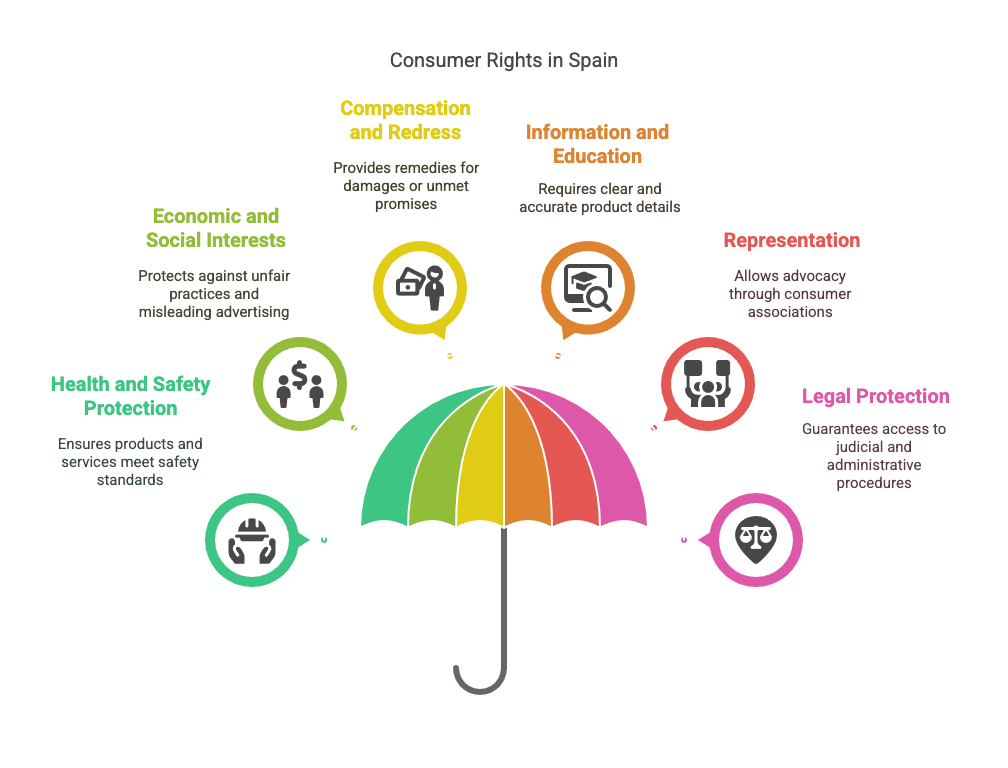
Spain's consumer protection framework isn't just a collection of rules—it's a commitment to safeguarding the everyday person in their interactions with businesses. At the heart of this framework are six fundamental rights that every consumer in Spain can count on.
When you're shopping in Barcelona, ordering services in Madrid, or making online purchases from anywhere in Spain, you're protected by these essential rights:
First and foremost is your right to health and safety protection. This means you shouldn't have to worry about products or services causing you harm. Whether it's food, toys, electronics, or services, they should all meet safety standards that protect your wellbeing.
Your economic and social interests are also shielded under Spanish law. This protection covers you against unfair contract terms (like hidden fees), misleading advertising, and other practices that might leave your wallet lighter than expected.
If something does go wrong, you have the right to compensation and redress. This isn't just about getting your money back—it's about being made whole when products or services cause damages or don't deliver what was promised.
Making informed choices is impossible without good information, which is why the right to information and education is so crucial. Businesses must provide clear, accurate details about what they're selling before you make a purchase decision.
Sometimes, individual voices need to be amplified to be heard, which is why Spanish law recognizes your right to representation through consumer associations. These groups can advocate for collective interests in ways individual consumers often cannot.
Finally, these rights would be meaningless without the right to legal protection—your access to effective judicial and administrative procedures when disputes arise.
What makes these rights powerful is that they're not just good intentions—they're legally enforceable. As Article 26 of the original law clearly states: "Manufacturers, importers and suppliers of products and services will be liable for their negligent actions or omissions unless they can show they met the requirements established by law and other cares and diligences demanded by the nature of the product, service or activity."
For us at Collection Agency Spain, these rights shape how we approach debt recovery. We understand that even when pursuing legitimate debts, we must respect these fundamental protections. Our collection practices are designed to be effective while honoring the dignity and rights that what is the consumer protection act in Spain guarantees to every consumer.
When dealing with financial matters, these protections become especially important—they ensure that even in challenging situations like debt collection, consumers are treated fairly and with respect.
One cornerstone of Spain's consumer protection framework is making sure that everything you buy or use is safe. This isn't just a nice idea – it's the law, specifically through Royal Decree 1801/2003, which brings the European General Product Safety Directive into Spanish daily life.
When you pick up a product in a Spanish store, you might not realize the extensive safety checks it should have gone through. What is the consumer protection act in Spain if not a shield that places clear responsibilities on the shoulders of both producers and distributors?
Producers in Spain can't just make and sell whatever they want. They must ensure everything they put on shelves is safe for consumers to use. This means providing clear information about any potential risks (think of those warning labels on hair dryers about not using them in bathtubs). They also need to stay informed about any risks that might emerge after their products hit the market.
If a company finds a safety issue with their product, Spanish law requires them to take action – and fast. This might mean withdrawing products from stores or even recalling items already in consumers' homes. They must also notify authorities about serious risks they find, which helps protect everyone.
Distributors aren't off the hook either. Even if they didn't make the product, they need to exercise due care in what they choose to sell. They must participate in monitoring product safety and maintain documentation that allows authorities to trace where products came from if problems arise. When safety issues emerge, distributors must work alongside producers and authorities to address the risks.
"According to Royal Decree 1801/2003, both producers and distributors have a duty to ensure that only safe products are placed on the market and sold."
We've seen these regulations in action here at Collection Agency Spain. In 2020, Barcelona witnessed a tragic case where improper gas pipe installation led to fatal intoxication. The court's decision established joint liability among all companies involved, sending a powerful message about how seriously Spanish courts take safety violations.
These safety obligations apply to every business operating in Spain, from the smallest shop in Valencia to the largest manufacturer in Madrid. When we work with clients across Spain, we always emphasize the importance of understanding and complying with these safety requirements – not just to avoid legal trouble, but because keeping consumers safe is simply the right thing to do.
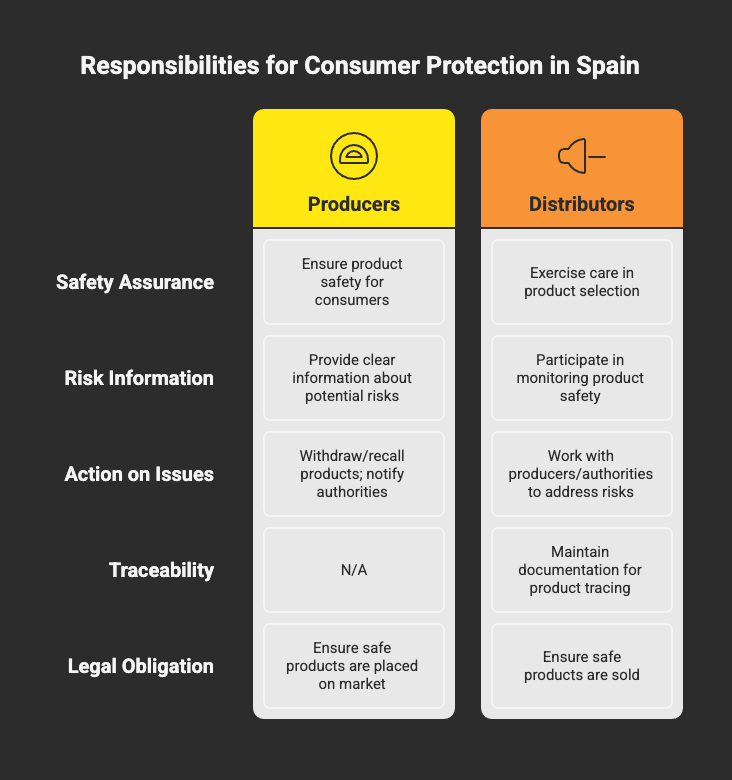
Spain takes consumer protection seriously, which is why the country has developed a robust market surveillance system that operates like a watchful guardian over product safety. This comprehensive network functions at both national and regional levels, with authorities working together to ensure what reaches consumers is safe.

When you're shopping in Madrid, Barcelona, or any Spanish city, you might wonder how unsafe products get spotted before they can cause harm. The answer lies in a multi-layered approach that catches problems from various angles.
Market surveillance inspections form the first line of defense, with regulatory officials regularly checking products in stores, warehouses, and online marketplaces. These aren't just random visits – they're strategic operations targeting high-risk products and following up on concerns.
Spain doesn't work in isolation either. As part of the European Union's Rapid Exchange of Information System (RAPEX), Spanish authorities receive immediate alerts about dangerous products identified elsewhere in Europe. This international cooperation helps prevent unsafe products from crossing borders.
Businesses themselves play a crucial role too. Under what is the consumer protection act in Spain, producers and distributors must report serious risks as soon as they become aware of them. This self-reporting requirement acknowledges that manufacturers often find problems before anyone else.
Perhaps most importantly, everyday consumers serve as vital safety monitors. When you notice something wrong with a product and report it, your complaint might be the first indication of a wider problem. Consumer associations amplify these individual voices, bringing patterns of concerns to authorities' attention.
Finally, healthcare professionals contribute valuable insights by reporting injuries that appear related to specific products, helping authorities connect the dots between medical cases and potential product defects.
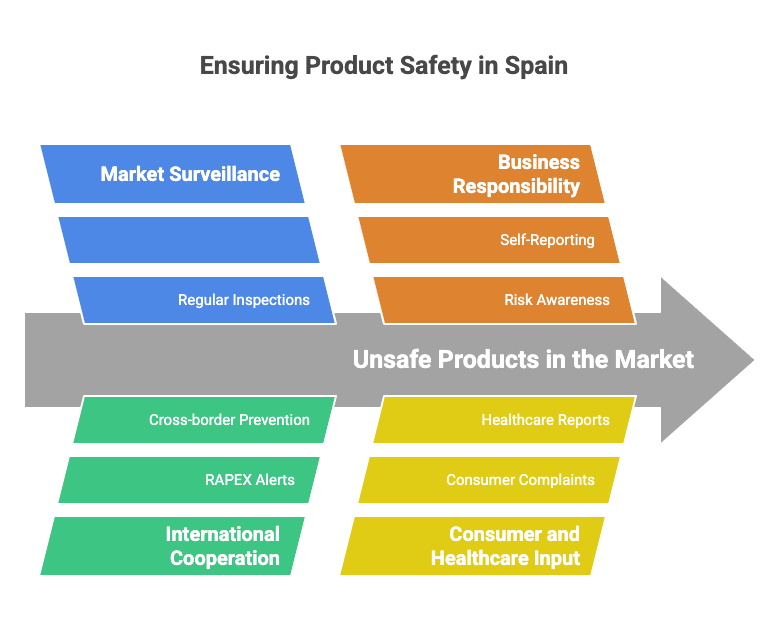
When a potentially dangerous product is identified, Spanish authorities don't waste time. The response is swift, methodical, and focused on protecting consumers.
First comes the verification process. Officials thoroughly evaluate whether the product meets applicable safety regulations and standards. They examine documentation, conduct tests, and assess real-world risks – not just theoretical ones.
If a product fails these checks, authorities implement protective measures that match the level of risk. For minor issues, this might mean requiring warning labels or improved instructions. For serious hazards, authorities can prohibit sales, order the withdrawal of existing stock from store shelves, or even mandate recalls of products already in consumers' homes.
The STATE SYSTEM FOR REPORTING CONSUMER PRODUCT INCIDENTS serves as the nervous system of this protection framework. This digital platform enables rapid information sharing among authorities throughout Spain and connects to European-level alert systems, ensuring that dangerous products identified in Valencia don't end up being sold in Barcelona.
At Collection Agency Spain, we've seen how costly non-compliance with these regulations can be for businesses. Beyond the immediate financial penalties, companies face reputational damage that can last for years. That's why we always emphasize to our clients that understanding and respecting what is the consumer protection act in Spain isn't just about following rules – it's about building sustainable business practices that protect both consumers and companies.
When we help businesses recover debts throughout Spain, we ensure all recovery practices align with these consumer protection frameworks, maintaining the delicate balance between effective collection and respecting consumer rights.
Spain's consumer protection laws don't exist in isolation – they've been significantly shaped by European Union policies, especially the Consumer Rights Directive. This important EU framework has been carefully woven into Spanish law through several updates to the General Law for the Defence of Consumers and Users.
The most significant recent change came through Royal Decree Law 7/2021, which brought two major European Directives (2019/770 and 2019/771) into Spanish law. These updates took effect on January 1, 2022, and have been further refined through additional amendments up to 2025, substantially strengthening consumer rights across Spain.
When you buy products in Spain today, you benefit from much more robust protections than ever before. Physical goods now come with a three-year warranty instead of the previous two years. If you purchase digital content or services, you're covered by a two-year warranty – particularly important in our increasingly digital world. Another practical improvement is that manufacturers must now keep spare parts available for 10 years after they stop making a product, doubling the previous 5-year requirement.
The burden of proof has also shifted significantly in consumers' favor. For the first two years after purchase, any defect is now legally presumed to have been present when you bought the item. This means you don't have to prove the product was faulty from the start – it's up to the seller to prove otherwise.
Digital rights have received special attention in these updates. What is the consumer protection act in Spain doing about digital services? It now explicitly covers contracts for digital content and services, even when you "pay" with your personal data rather than money. Companies must provide digital content "without undue delay" after you complete a purchase, giving you faster access to what you've paid for.
Price transparency has also improved dramatically. Businesses must now show you the final price before you complete any transaction, and you must explicitly agree to any additional charges. Remember those annoying pre-ticked boxes that added travel insurance or priority boarding to your flight? Those are now illegal. Similarly, customer service phone lines can't charge premium rates – they must stick to basic call charges.
As EU Justice Commissioner Viviane Reding put it: "No more pre-ticked boxes when you buy a plane ticket, no more extra charges for paying with your credit card online and no more traders telling you that you can't return a good you bought online."
For more details on how these directives protect your digital rights, you can review Directive (EU) 2019/770 directly.
These changes represent a genuine win for consumers across Spain, particularly when it comes to digital purchases. For businesses, including debt collection agencies like ours, they mean paying careful attention to compliance, especially regarding warranty periods and how we communicate with consumers. At Collection Agency Spain, we accept these protections as they create a fairer marketplace for everyone.
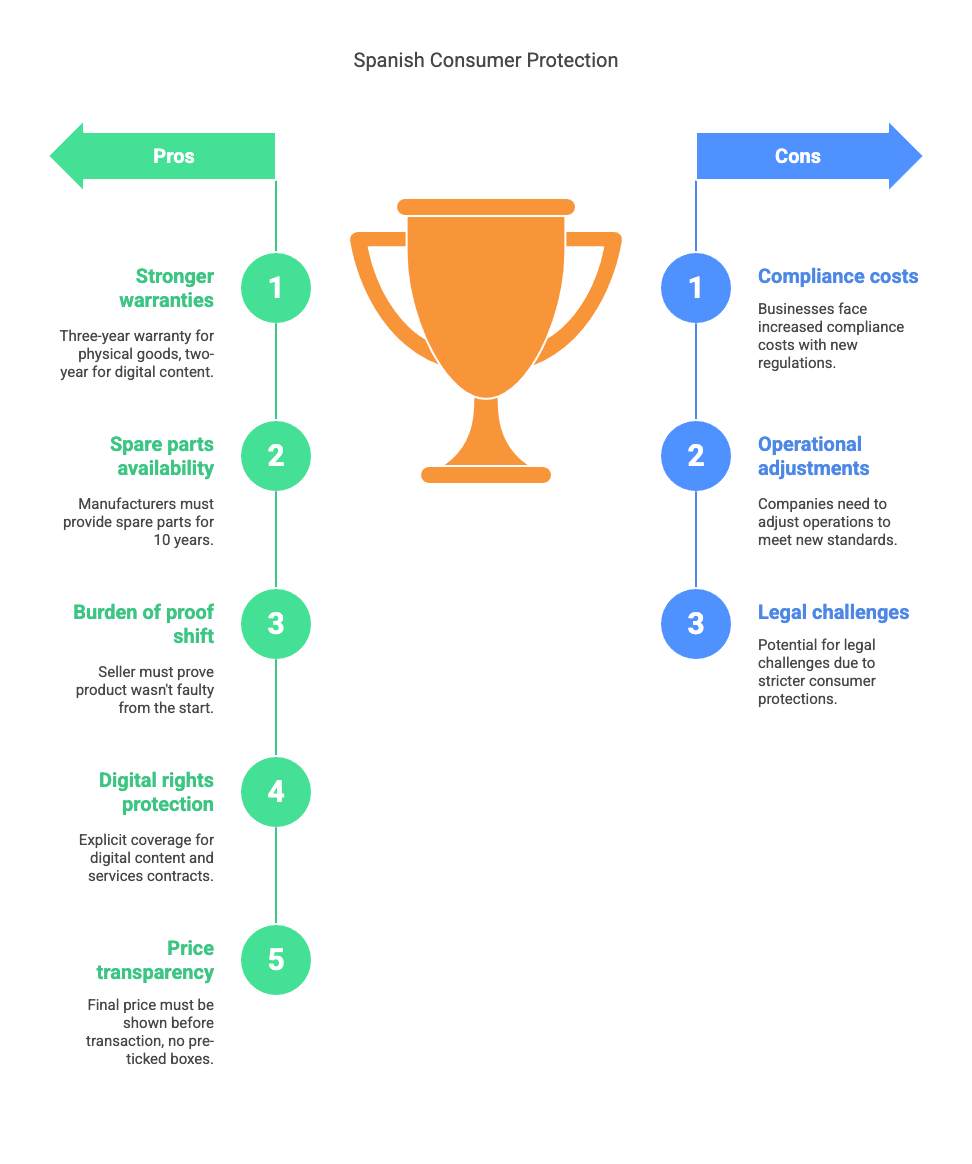
When something goes wrong with a purchase in Spain, consumers aren't left to fend for themselves. Spanish law provides several clear pathways to resolve disputes and seek compensation. Whether you're dealing with a faulty product, misleading service, or unfair contract terms, knowing how to steer the complaint process can make all the difference.
The journey to resolve a consumer dispute in Spain typically begins with direct communication. Under what is the consumer protection act in Spain, consumers should first reach out directly to the business with their concerns.
Start by sending a formal written complaint to the company – this creates an important paper trail. Be specific about the problem, include copies (never originals) of receipts or contracts, and clearly state what resolution you're seeking. Many disputes get resolved at this early stage when businesses understand the issue.
After submitting your complaint, patience is key. Give the business a reasonable opportunity to respond – typically at least 30 days. Keep all communication records, including delivery receipts for letters or screenshots of emails. If the company doesn't respond or offers an unsatisfactory solution, these records will strengthen your case when you escalate the matter.
Timing matters in consumer complaints. In most cases, you have three years from the purchase date to make a claim about product defects, though this period can vary for specific situations. Don't wait until the last minute – the sooner you address issues, the easier they typically are to resolve.
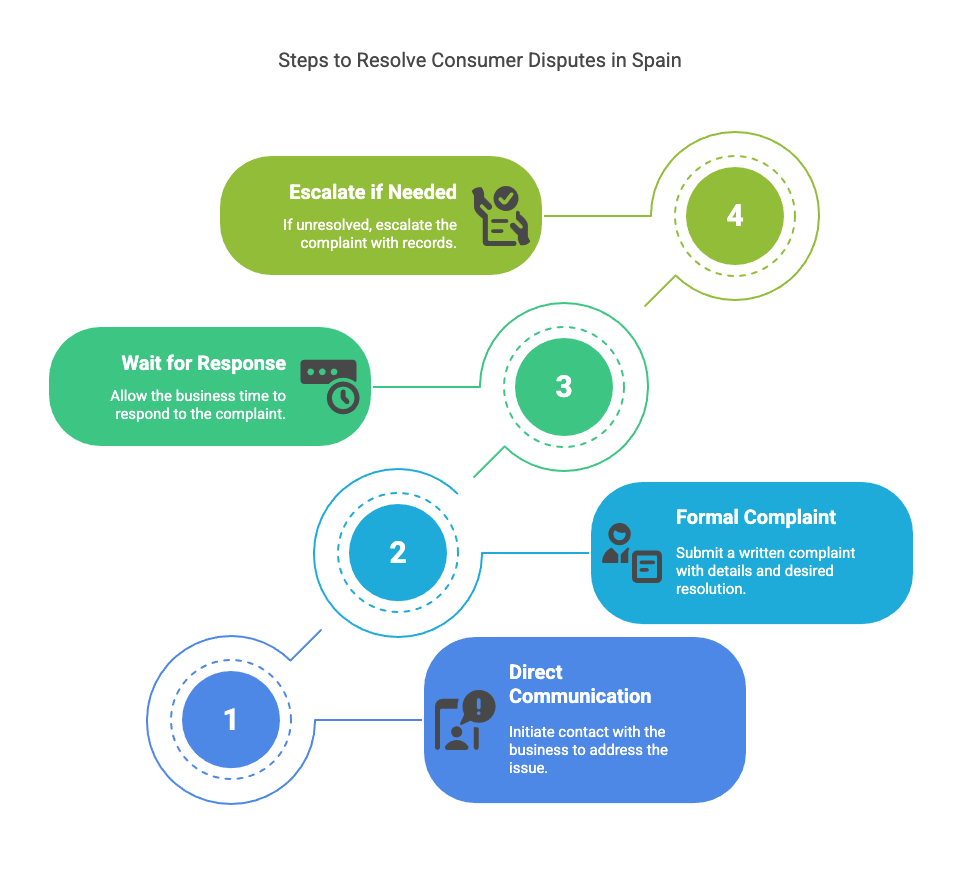
When direct communication fails, Spain offers several consumer-friendly paths to resolution without immediately jumping to court proceedings.
The Consumer Arbitration System (Sistema Arbitral de Consumo) provides a free, efficient way to resolve disputes. Many Spanish businesses display the arbitration system logo, indicating they've agreed to participate. The process is straightforward – submit your documentation to the local arbitration board, attend a hearing, and receive a binding decision, typically within 90 days. This system has successfully resolved thousands of consumer disputes across Spain, from appliance failures to service contract disputes.
For those who prefer a less formal approach, mediation services bring both parties together with a neutral third party. Unlike arbitration, mediation doesn't impose a solution but helps both sides find common ground. This approach works particularly well when you want to maintain a relationship with the business, such as with your regular service providers.
As a last resort, consumers can turn to civil courts. While more time-consuming and potentially costly, the courts provide the full weight of legal enforcement. For claims under €2,000, the process is simplified and doesn't require legal representation, making it more accessible to everyday consumers.
For cross-border disputes within the EU, the European Consumer Centre provides specialized assistance to Spanish residents dealing with businesses in other EU countries. Additionally, the European Online Dispute Resolution platform offers a convenient way to resolve issues with online purchases.
A memorable example occurred in 2024 in Elche, when a consumer successfully steered these procedures after repeated attempts to have a defective appliance repaired. The civil court not only ordered reimbursement for repair costs but also awarded compensation for the inconvenience – demonstrating how these mechanisms can effectively protect consumer rights when properly used.
At Collection Agency Spain, we recognize the importance of these consumer protection mechanisms. Our debt collection practices always respect consumers' rights to dispute claims through these legitimate channels, and we encourage fair, transparent resolution whenever possible. Understanding both sides of consumer disputes helps us maintain ethical practices while effectively serving our clients across Barcelona, Madrid, Valencia, and beyond.
When it comes to enforcing consumer protection laws in Spain, there's a fascinating web of authorities working at different levels to ensure your rights are protected. This multi-layered approach provides comprehensive coverage, though sometimes it can create a bit of jurisdictional overlap – think of it as having multiple guardians looking out for your interests.
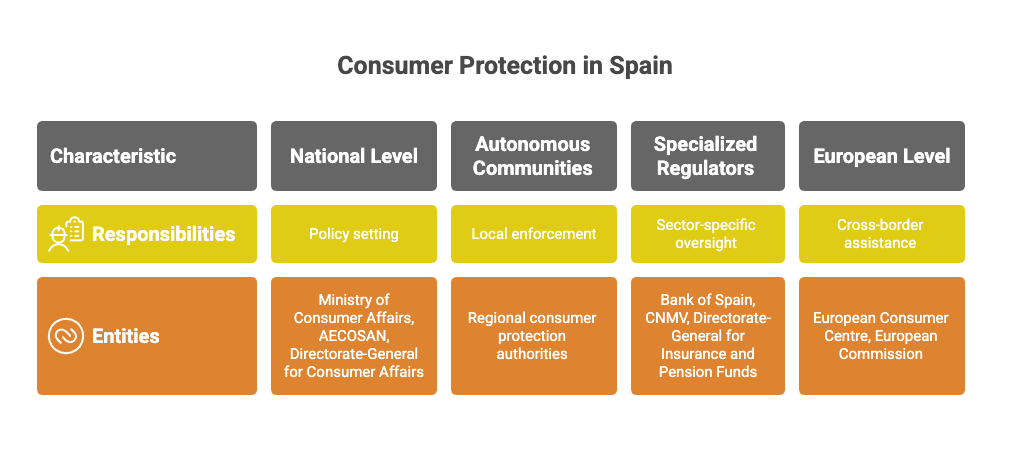
Spain's approach to consumer protection is like a well-coordinated team effort, with responsibilities shared across various levels of government.
At the national level, the Ministry of Consumer Affairs stands as the primary guardian of consumer interests, setting the overall policy direction. Working alongside them is the Spanish Agency for Consumer Affairs, Food Safety and Nutrition (AECOSAN), which implements these policies and coordinates with regional bodies. The Directorate-General for Consumer Affairs handles specific consumer protection initiatives, ensuring consistent application across the country.
Each of Spain's 17 Autonomous Communities has its own regional consumer protection authorities. These local watchdogs handle most of the day-to-day enforcement activities – they're the ones conducting inspections, investigating complaints from consumers like you, and imposing sanctions when businesses step out of line. This regional approach ensures that enforcement is custom to local needs while maintaining national standards.
For specific sectors, specialized regulators take the lead. The Bank of Spain keeps a watchful eye on consumer protection in banking services, while the Spanish Securities Market Commission (CNMV) regulates investment services. If you have issues with insurance products, the Directorate-General for Insurance and Pension Funds is there to help.
Beyond Spain's borders, the European Consumer Centre in Spain assists with cross-border disputes, and the European Commission oversees compliance with EU directives, ensuring that Spanish consumers benefit from European-wide protections.
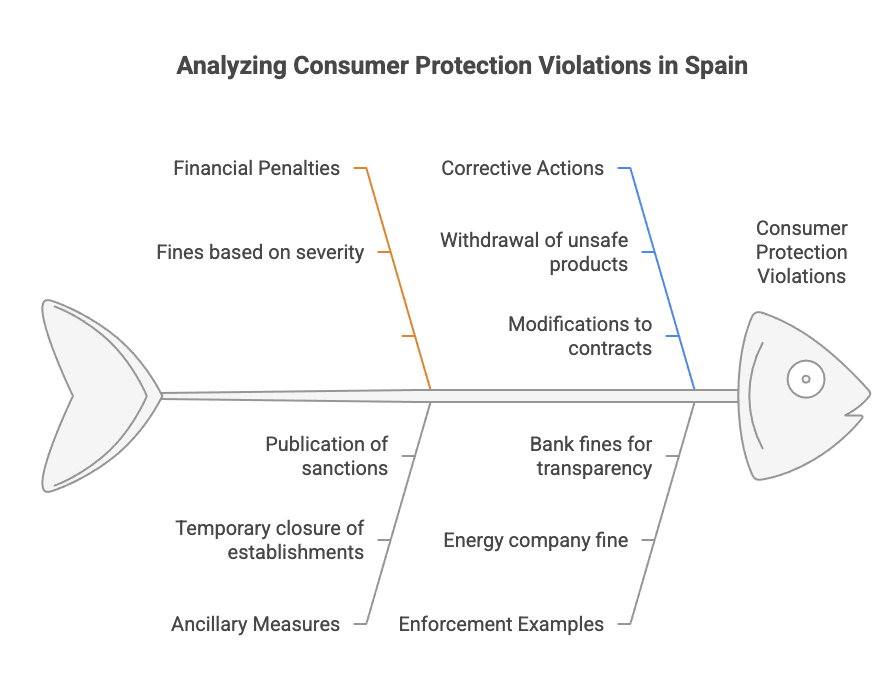
When businesses violate what is the consumer protection act in Spain, they face a range of penalties designed to ensure compliance and deter future violations.
For administrative sanctions, the system uses a tiered approach based on severity. Minor infractions might result in fines up to €3,005.06, while moderate infractions bump that up to between €3,005.07 and €15,025.30. For serious violations that put consumers at significant risk, businesses can face hefty fines ranging from €15,025.31 up to a whopping €601,012.10. In particularly egregious cases, authorities can increase these fines to five times the value of the goods or services involved – a powerful deterrent for businesses considering cutting corners.
Beyond financial penalties, authorities can implement ancillary measures like temporarily closing establishments (for up to five years in serious cases), publishing sanctions in official bulletins and media (creating significant reputational damage), and prohibiting businesses from contracting with public administrations.
Authorities also have the power to order corrective actions, including the withdrawal or recall of unsafe products, requiring businesses to publish corrective statements, and mandating modifications to contracts or practices to bring them into compliance.
These enforcement mechanisms have real teeth, as demonstrated by recent high-profile cases. In 2024, the Spanish National Markets and Competition Commission slapped a €12.5 million fine on an energy company for misleading contract practices. Similarly, in 2023, Spain's largest banks were fined a combined €45 million for lack of transparency in mortgage loans. These cases show that Spanish authorities don't hesitate to impose significant penalties when consumer rights are violated on a large scale.
Consumer protection in Spain is constantly evolving to address new challenges and opportunities. Several noteworthy trends are shaping the landscape in 2025:
There's an increasing focus on digital markets, with authorities paying closer attention to online marketplace practices. The implementation of the Omnibus Directive is enhancing transparency in online reviews and price reductions, while digital service providers and platforms face greater scrutiny than ever before.
Collective redress mechanisms are also being strengthened, with proposed legislation making it easier for consumer associations to represent groups of affected consumers. This means that if you and others face similar violations, you may have more powerful tools to seek justice collectively.
Protection for vulnerable consumers received a boost with the 2022 amendment (Law 4/2022), which introduced a more dynamic approach to identifying vulnerability. Rather than using rigid categories, authorities now assess consumer circumstances on a case-by-case basis to provide appropriate protections.
Sustainability and environmental considerations are also being integrated into consumer protection frameworks, with increased focus on product durability and repairability – reflecting growing consumer awareness of environmental impacts.
For businesses working with us at Collection Agency Spain in cities like Madrid, Barcelona, or Valencia, staying current with these evolving trends isn't just about avoiding penalties – it's about building consumer trust and contributing to a marketplace that works fairly for everyone. We always ensure our debt recovery practices comply with these robust consumer protection standards, balancing effective collection with respect for consumer rights.
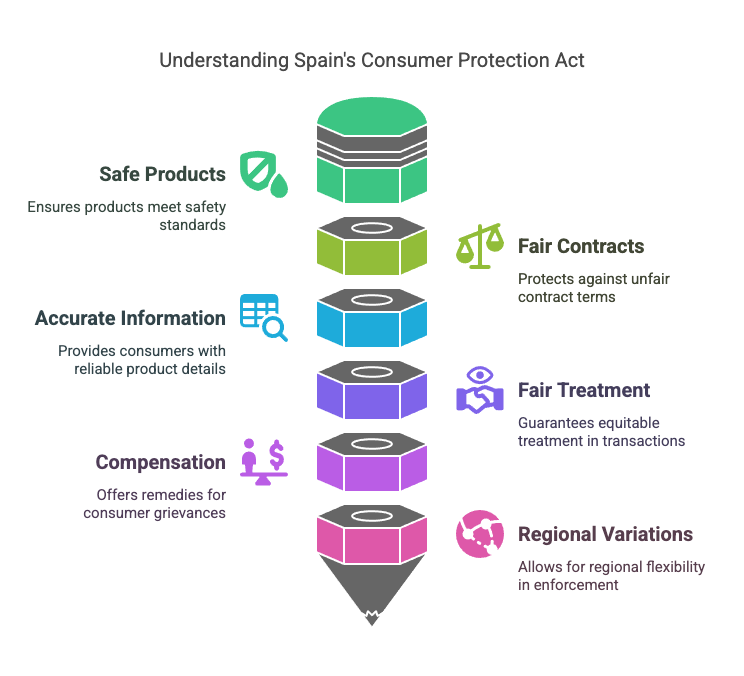
When people ask "what is the consumer protection act in Spain," they're typically referring to the General Law for the Defence of Consumers and Users (GLDC). This cornerstone legislation, established through Royal Legislative Decree 1/2007, serves as Spain's comprehensive consumer protection framework.
Think of the GLDC as a safety net designed to protect you in all your consumer interactions. It's not a static document—it's constantly evolving, with regular updates to incorporate European directives and address emerging consumer issues. The law covers everything from your right to safe products to protection against unfair contract terms.
At its heart, the GLDC ensures you have access to accurate information about products and services, fair treatment in contracts, and proper compensation if things go wrong. Whether you're shopping in a traditional store in Madrid or making online purchases from Barcelona, this legislation applies to all consumer-business relationships throughout Spain.
While the core protections are consistent nationwide, it's worth noting that enforcement can vary slightly between autonomous communities, as each region has some flexibility in how they implement these protections.
If you believe your consumer rights have been violated in Spain, you have several paths to resolution. The process typically starts with direct communication with the business. Always submit your complaint in writing and keep copies of all receipts and communications—these paper trails are invaluable if the dispute escalates.
Every business in Spain must provide standardized complaint forms, known as hojas de reclamaciones. These forms are your first formal step in the complaint process and businesses are legally required to make them available upon request.
When direct communication doesn't resolve your issue, Spain offers robust support systems. Each autonomous community maintains consumer information offices where you can receive free advice and mediation assistance. Consumer associations can also provide guidance and sometimes even legal representation if needed.
For many disputes, the Consumer Arbitration System offers a faster alternative to court proceedings. This free service results in binding decisions, though businesses must have previously agreed to participate in the system.
If you've purchased something from another EU country while in Spain, you're not left stranded—the European Consumer Centre in Spain can help with cross-border disputes, and the EU's Online Dispute Resolution platform provides additional support for online purchases.
As a last resort, you can take legal action through civil courts. For widespread issues affecting many consumers, collective actions may be possible, while small claims procedures can handle minor disputes efficiently.
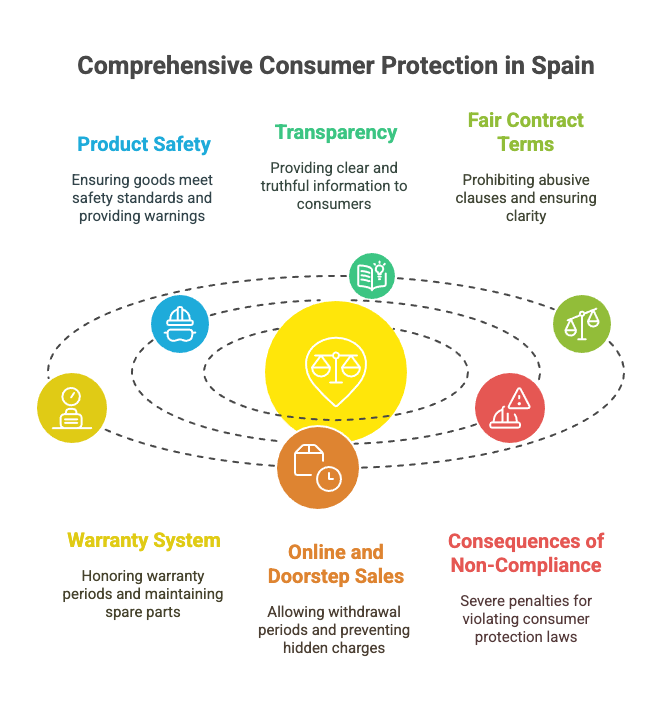
Businesses operating in Spain face significant responsibilities under consumer protection laws. Product safety stands as a paramount obligation—companies must ensure their goods and services meet all safety standards and provide clear warnings about any potential risks. When safety issues arise, businesses must promptly report problems and implement recall procedures when necessary.
Transparency is another core requirement. Businesses must provide clear, truthful information before any purchase, ensure pricing is completely transparent (including all mandatory costs), and clearly identify themselves with accurate contact details. Gone are the days of hidden fees or mysterious vendor identities.
Contract terms must be fair and balanced. The law prohibits abusive clauses that disadvantage consumers, requires contracts to be presented in clear, accessible language, and prevents businesses from limiting your legally protected rights.
The warranty system in Spain is particularly strong. Businesses must honor the legal warranty period—three years for physical goods and two years for digital content—and maintain spare parts for a full decade after a product is discontinued. When products don't conform to expectations, companies must provide repair, replacement, price reduction, or contract termination.
For online or doorstep sales, businesses must allow a 14-day withdrawal period and process refunds promptly, including delivery costs. They're also prohibited from using pre-ticked boxes to sneak in additional services or payments.
The consequences of non-compliance can be severe, with fines reaching over 600,000 euros for serious violations, along with potential business closures and lasting reputational damage.
At Collection Agency Spain, we recognize the importance of these consumer protections. Our debt collection practices are carefully designed to respect consumer rights while effectively recovering debts for our clients across Madrid, Barcelona, Valencia, and beyond. We believe that ethical debt collection isn't just legally required—it's good business.
Spain's consumer protection framework is truly impressive. Built on strong constitutional principles and improved by European directives, the General Law for the Defence of Consumers and Users offers robust safeguards for consumers while clearly defining what businesses must do to stay compliant.
So, what is the consumer protection act in Spain really about at its core? It's about balance — protecting people while creating a fair marketplace where ethical businesses can thrive.
Throughout this article, we've seen how Spain has created one of Europe's most comprehensive consumer protection systems. The legal foundation is rock-solid, starting with the Spanish Constitution itself and flowing through detailed legislation that covers everything from product safety to fair contracts.
Spanish consumers enjoy remarkable protections — from health and safety guarantees to economic safeguards and the right to clear information. When something goes wrong, they have multiple paths to resolution, whether through direct complaints, consumer associations, arbitration, or the courts.
For businesses, this framework isn't just about avoiding penalties (though those can be substantial). It's about building trust. When consumers know they're protected, they shop with confidence. That's good for everyone.
The system continues to evolve, too. Recent changes have strengthened warranty periods, improved protections for digital content, and provided additional safeguards for vulnerable consumers. This adaptability ensures the framework remains relevant in our rapidly changing marketplace.
At Collection Agency Spain, we understand this delicate balance intimately. When helping our clients recover debts across Madrid, Barcelona, Valencia and beyond, we always maintain the highest standards of compliance with consumer protection laws. We believe effective debt recovery and respecting consumer rights can – and must – go hand in hand.
For businesses struggling with unpaid invoices in Spain, we offer a path forward that steers the complex legal landscape while maintaining ethical standards. Our team doesn't just understand the letter of Spain's consumer protection laws – we accept their spirit.
The result? A debt collection approach that protects your business interests while respecting the robust consumer rights framework that makes Spain's marketplace fair for everyone.
For more information about debt collection in Spain that respects consumer protection principles, visit our website or contact our offices in Madrid, Barcelona, or any of our locations across Spain.
Businesses often become known today through effective marketing. The marketing may be in the form of a regular news .
Contact Us